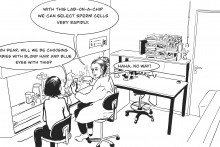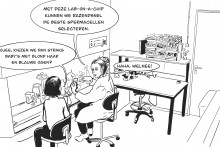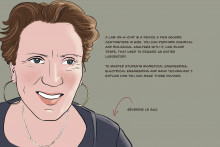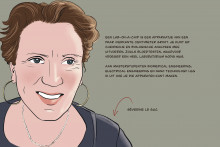Suppose doctors could perform a covid19 test without having to send our nasal mucus to a laboratory. What is now conducted in the laboratory would take place on a chip several square centimetres in size, equipped with a miniature lab. The nasal mucus would flow through tiny channels past sensors and, thanks to built-in electronics, the measurement results would be readable within minutes. We call the miniature lab a 'lab-on-a-chip', also known as a microfluidic chip.
Not that such a miniature covid19 test already exists, by the way. However, associate professor Loes Segerink was already working on lab-on-a-chips for sperm testing, early bladder cancer diagnostics and plant cultivation. Mini-labs in these areas can save time and money, but can also provide more reliable results: if a man can readily test his sperm several times, it says more about his fertility than a single snapshot. However, none of the tests has yet led to a ready-made test, says Segerink.
That's a big misconception among the public: that if we got something working in our laboratory, it could be in the shop tomorrow. Unfortunately, this is not the case. Translating it into something that is reliable and that everyone can use may well take as much time as our research'.

Repeating an experiment is in itself rather complicated. 'You may read an article with impressive data and think, I want that! If you imitate it, however, it turns out that certain details are missing. Then you think, Jesus, this is terrible! People don't do that purpose, though. This often concerns silly, practical problems that someone already ran into, but forgot to mention.' She tells how a student of hers once slightly overtightened a screw on a chip so that the liquid didn't run through properly. He spent three-quarters of a day struggling with the issue. He was able to ask me for help, but if you read my article and don't know this, you won't find out at all why the setup isn't working. I think there's still room for improvement in that regard for the scientific community.
Science not only works slower than people often think, but the projects are also considerably less spectacular than science fiction suggests. For my fertility research, I measure sperm cells,' explains the scientist. I sometimes get the question: can you also select cells with blonde hair and blue eyes? However, I can only select sperm cells which increase the chance of pregnancy'.
Still, she finds such conversations with people outside the field important. 'They hold up a mirror for me. Why am I doing things, am I behaving ethically, am I explaining things properly? If people think I'm selecting sperm to produce children with blue eyes, then I have to reconsider the image we give people.’











